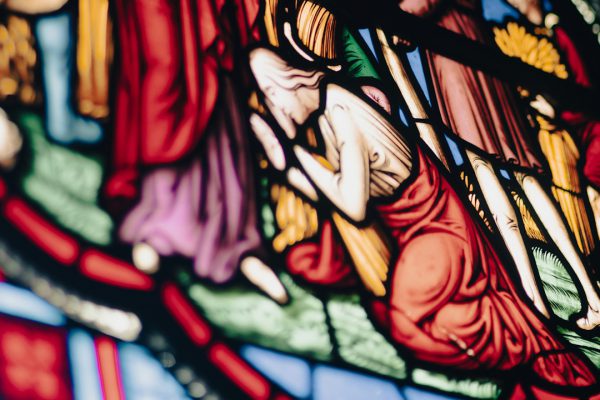In order to declare the whole counsel of God it’s important that we not only preach verse by verse through books of the Bible but that we actually get to as many books of the Bible as we can! To this end, on Sunday, July 25th, we will be taking a short, five-week break from our sermon series through Romans to study the book of Ruth. By breaking up Romans (NT letter) with Ruth (OT narrative) we can work towards helping our church maintain a balanced diet of hearing sermons from both Old and New Testaments which also cover the various types of literature found in Scripture.
Why Ruth?
The book of Ruth is a beautifully and written story of love, faithfulness, and restoration that ultimately points us to God’s purposes of redemption in Christ. It serves as a hinge in the story of Israel, marking the transition from the age of judges to the age of kings, and is the only book in the Old Testament named after a non-Israelite. Rather than focusing on prophets, priests, and kings, it follows the ordinary lives of a handful of ordinary characters: Naomi, the Moabite Ruth, and Boaz. By studying this concise and masterfully crafted story we not only learn about Israel’s history, the lineage of David and Israel’s Messiah, but we also discover many of the themes that get at the heart of Old Testament and the story of redemption.
What does Ruth teach us about God?
First, Ruth puts the providence of God on full display. While there are no burning bushes, plagues, or pillars of fire, we see God involved in the ordinary details of the everyday lives of individuals and how he uses these ordinary people and ordinary events to fulfill his covenant promises. It shows how God even makes himself known to his people through famine, death, barrenness, and exile.
Second, Ruth highlights the characteristic of God summed up by the Hebrew word hesed (Ruth 1:8; 2:20). This word has been translated as the lovingkindness, covenant loyalty, graciousness, mercy, goodness, and steadfast love of God because there is no single English word that can capture all that it entails. Lutheran scholar, Chad Bird, sums it up quite well:
Chesed is truly untranslatable love. No-holds-barred mercy. Covenant faithfulness even if it costs God the lifeblood of his beloved Son. Chesed is the beating heart of God in cruciform display. The kind of love that chases us to the ends of the earth, picks us up, places us atop divine shoulders, and dances all the way home. There really is only one word that encompasses the totality of what chesed is—Christ himself. He is the chesed of the Father made flesh.
It’s the hesed of God that causes him to bring Naomi, as hopeless and bitter as she may have become, from emptiness to fullness. It’s God’s steadfast love to his people that causes him to visit them with food, despite their sin and rebellion that likely brought about the famine (Ruth 1:1, 6). It’s God’s loyalty and kindness that welcomes Ruth, a Moabite, under his wings and gives her refuge (2:12). And it’s God’s hesed that ultimately provides his people, despite their constant idolatry and rebellion, a Shepherd-King who is greater than David (Ruth 4:18-20; Matt. 1:1-17)
What does Ruth teach us about Jesus?
Third, Ruth teaches us about the gospel of Jesus Christ. At the end of the story we find that Boaz married Ruth to redeem the lineage of Elimelech and they become part of the lineage of Jesus Christ. But that’s not the only connection to Jesus. What we discover is that Jesus is the true and greater Boaz, who redeems people of God. Like Ruth, we come to Jesus with nothing to offer, hungry, homeless, estranged, and in need of aid. Jesus, like Boaz, shows us the hesed of God by redeeming and providing for us. Through his substitutionary death on the cross for our sins, we come to find refuge under his wings, we find favor in his eyes, we sit at his table, and we eat until we are satisfied (Ruth 2:10-14).
What does Ruth teach us about the people of God?
While Ruth is ultimately about God, it also gives us a remarkable picture of the church. In every chapter we meet characters who demonstrate the hesed of God, who go over and beyond to show kindness, faithfulness, and loyalty to others. In his commentary on Ruth, Daniel Block summarizes it this way:
In stark contrast to the Book of Judges, where many of the major characters are spiritually compromising at best and pagan in outlook and conduct at worst, every person in this story is a decent person; they are presented as authentic people of faith. Although ḥesed is only attributed explicitly to Ruth (3:10), the kindness, goodness, loyalty, and faithfulness that are characteristic of God are true of his people. Indeed, ranking just below the narrator’s concern to essay God’s providential care and direction of history is his goal of describing what ḥesed looks like in the context of personal, family, and communal life.
While the world looks more like the book of Judges, with everyone doing what is right in their own eyes (Judges 21:25), the church is called follow the examples of the characters in the book of Ruth, who constantly show loyalty and lovingkindness to one another. As we we seek to demonstrate the hesed of God we will shine like stars in an increasingly dark, hostile, and polarizing world.
Recommended Resources
- Message of Ruth: The Wings of Refuge, Bible Speaks Today commentary series, David Atkinson
- From Famine to Fullness: The Gospel According to Ruth, by Dean R. Ulrich
- Unceasing Kindness: A Biblical Theology of Ruth, Vol. 41 (New Studies in Biblical Theology), Peter Lau and Gregory Goswell
- Overview of Ruth at BibleProject.com

Mitch Bedzyk serves as a pastor Emmanuel Community Church, overseeing music and Sunday Classes. He received his Master of Theological Studies from Midwestern Baptist Theological Seminary and works in IT for the NY Office of Mental Health. He and his wife, Sarah, have five children: Kya, Khalli, Oliver, Amelia, and Micah. In his spare time he enjoys reading, coffee, guitar, being an MLS fanatic and playing fantasy soccer.




